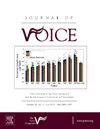普通话版歌唱嗓音障碍指数-10(MSVHI-10)的可靠性和有效性。
IF 2.5
4区 医学
Q1 AUDIOLOGY & SPEECH-LANGUAGE PATHOLOGY
引用次数: 0
摘要
目的:本研究旨在评估普通话版歌唱声音障碍指数-10(MSVHI-10)的信度和效度:本研究旨在评估普通话版嗓音障碍指数-10(MSVHI-10)的信度和效度:方法:115 名年龄在 21 岁至 65 岁之间的歌手参加了本研究。所有受试者均完成了普通话版 SVHI-10 和嗓音障碍指数-10 (VHI-10)。其他收集的信息包括性别、年龄、歌唱表演类型和累计歌唱年限。我们还要求受试者自我报告是否有歌唱嗓音不适。我们对 MSVHI-10 的效度、信度和接收者工作特征曲线(ROC)进行了统计分析:结果显示,MSVHI-10 具有较高的内部一致性(Cronbach's α =0.96),每个问题的得分在 0.57 至 0.90 之间。43 位歌手重新填写了 MSVHI-10,间隔时间为 12.7 ± 9.3 天(平均值 ± 标准差),结果显示测试-重测信度较高(r = 0.98,P < 0.01)。SVHI-10 评分与 VHI-10 评分有明显相关性(r = 0.54-0.72,P < 0.01)。ROC 分析显示,在区分有无歌唱嗓音不适的受试者方面,SVHI-10 具有很高的区分准确性,其曲线下面积(AUC)为 0.97。以 21.5 分为临界值,灵敏度和特异度分别为 85.7% 和 95.9%:普通话版 SVHI-10 已被证明是评估歌唱嗓音不适自我感觉的可靠而有效的工具。本文章由计算机程序翻译,如有差异,请以英文原文为准。
Reliability and Validity of the Mandarin Version of Singing Voice Handicap Index - 10 (MSVHI-10)
Objectives
The present study aims to evaluate the reliability and validity of the Mandarin version of the Singing Voice Handicap Index-10 (MSVHI-10).
Methods
One hundred and fifteen singers, aged from 21 to 65, participated in this study. All the subjects completed the Mandarin version of the SVHI-10 and the Voice Handicap Index-10 (VHI-10). Other gathered information include sex, age, type of singing performance, and the accumulated years of singing. We also asked the participants to self-report the presence of singing voice complaint. Statistical analyses were performed to evaluate the validity, reliability, and the Receiver Operating Characteristic (ROC) curve of MSVHI-10.
Results
The results showed high internal consistency (Cronbach's α =0.96), with the scores of each question ranged from 0.57 to 0.90. Forty-three singers re-filled the MSVHI-10 with an interval of 12.7 ± 9.3 days (mean ± standard deviation), and the results showed a high test-retest reliability (r = 0.98, P < 0.01). The SVHI-10 scores were significantly correlated with the VHI-10 (r = 0.54-0.72, P < 0.01). ROC analysis revealed a high differentiating accuracy for distinguishing between the subjects with or without singing voice complaints, with an area under the curve (AUC) of 0.97. At the cut-off score of 21.5, the sensitivity and specificity were 85.7% and 95.9%, respectively.
Conclusions
The Mandarin version of the SVHI-10 has been shown to be a reliable and valid instrument for evaluating the self-perception of singing voice complaints.
求助全文
通过发布文献求助,成功后即可免费获取论文全文。
去求助
来源期刊

Journal of Voice
医学-耳鼻喉科学
CiteScore
4.00
自引率
13.60%
发文量
395
审稿时长
59 days
期刊介绍:
The Journal of Voice is widely regarded as the world''s premiere journal for voice medicine and research. This peer-reviewed publication is listed in Index Medicus and is indexed by the Institute for Scientific Information. The journal contains articles written by experts throughout the world on all topics in voice sciences, voice medicine and surgery, and speech-language pathologists'' management of voice-related problems. The journal includes clinical articles, clinical research, and laboratory research. Members of the Foundation receive the journal as a benefit of membership.
 求助内容:
求助内容: 应助结果提醒方式:
应助结果提醒方式:


